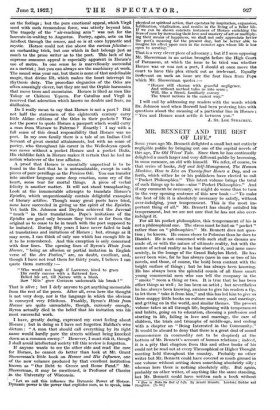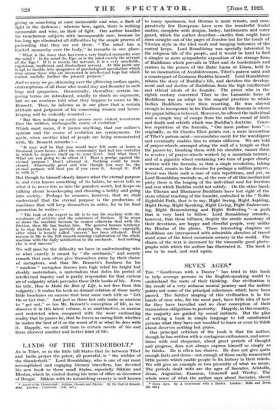MR. BENNETT AND THE BEST OF LIFE.*
SOME years ago Mr. Bennett delighted a small but not entirely negligible public by bringing out one of the capital novels of this age, The Old Wives' Tale. Since then he has continually delighted a much larger and very different public by becoming, in some measure, an old wife himself. We refer, of course, to that series of books, Self and Self-Management, The Human Machine, How to Live on Twenty jour Hours a Day, and so forth, which either he or his publishers have elected to call " Pocket Philosophies." This latest volume brings the total of such things up to nine—nine " Pocket Philosophies." And if any comment be necessary, we might do worse than to turn to the very opening sentence of this new book :—" To make the best of life it is absolutely necessary to satisfy, without over-indulging, your temperament. This is the most im-
portant thing of all." Mr. Bennett has clearly satisfied his temperament, but we are not sure that he has not also over- indulged it
For all his pocket philosophies, this temperament of his is not a philosophical one. The stress must be laid on " pocket " rather than on " philosophies." Mr. Bennett does not ques- tion ; he knows. He comes closer to Polonius than he does to Hamlet. He is not concerned with such stuff as dreams are made of, or with the nature of ultimate reality, but with the nature of actual reality as he has observed it, and none more acutely, in the lounge of the Grand Babylon Hotel. He has never been wise, for he has always (save in one or two of his novels, and those, of course, the best) been content with the bright surface of things ; but he has always been knowing. He has always been the splendid cousin of all those smart young commercial men who can tell the company in the " smoke " room a thing or two. It is true that he has been other things as well ; he has been an artist ; but nevertheless he has always been knowing, anxious to give his readers a tip, to let them " take it from him," and this has led him to give us these snappy little books on culture made easy, and marriage, and getting on in the world, and similar themes. The present volume takes us all through life, beginning with temperament and habits, going on to education, choosing a profession and starting in life, falling in love and marriage, the care of children, the trials and triumphs of middle-age, and ending with a chapter on " Being Interested in the Community." It would be absurd to deny that there is a great deal of sound commonsense (a commodity not to be despised) at the bottom of Mr. Bennett's account of human relations ; indeed, it is a pity that chapters from this and other books of his could not be read out at every Theosophical or Higher Thought meeting held throughout the country. Probably no other writer but Mr. Bennett could have covered so much ground in one volume without setting down something absolutely silly ; whereas here there is nothing absolutely silly. But again, probably no other writer, of anything like the same standing, but Mr. Bennett could have written such a book without • How to Make the Bat of Life. By Arnold Bennett. London: Hodder and
Stoughton. In.
giving us something at once memorable and wise, a flash of light in the darkness ; whereas here, again, there is nothing memorable and wise, no flash of light. Our author handles his treacherous subjects with incomparable ease, because he has long ago eliminated all difficulties by the simple process of pretending that they are not there. " The mind has a limited monarchy over the body," he remarks in one place.
" What is the force that has even a very limited monarchy over the mind Is the mind the Ego, or is the mind merely the servant of the Ego ? If it is merely the servant, it is a very unreliable, capricious, inefficient and disobedient servant. At this point one is apt to tumble into quagmires of psychological speculation which may amuse those who are interested in intellectual bogs but which cannot usefully further the present purpose."
And so away we go, skimming over the glittering surface again, contemptuous of all those who would stay and flounder in such bogs and quagmires. Occasionally, thereafter, certain im- posing terms are introduced, usually to clinch an argument, but we are nowhere told what they happen to mean to Mr. Bennett. Thus, he informs us in one place that a certain attitude and judgment of his concerning women and house- keeping will be violently resented :— " But then nothing ma earth arouses more violent resentment than the ruthless, unchangeable course of evolution."
Which must mean, if it means anything, that our author's opinion and the course of evolution are synonymous. Or again, when another kind of people are being remonstrated with, Mr. Bennett remarks :- " It may well be that you would have felt more at home a thousand years hence, after the community had had ten centuries in which to improve itself up to your level. And what then ? What are you going to do about it ? Bear a grudge against the eternal purpose ? Don't attempt it. Nothing could be more absurd. Abnormally great and wise though you may be, the eternal purpose will beat you if you cross it. Accept it. Fall in with it.
But though he himself clearly knows what the eternal purpose is, and even knows something of its habits, he never tells us
what it is, never lets us into the grandest secret, but keeps on talking about housekeeping and choosing a hobby and going into society. Perhaps he assumes, however, that we shall understand that the eternal purpose is the production of machines that will keep themselves in order, for in his final peroration he writes :- " The task of the expert in life is to run his machine with the maximum of activity and the minimum of friction. If he stops or slows the machine because he cannot otherwise deal with the friction, then life has beaten him. The general human tendency is to stop friction by partially stopping the machine—especially after what is loosely called `success' has been attained. Real success in life is the full smooth-running exploitation of the whole machine with the daily satisfaction to the mechanic. And nothing else is real success."
We will pass by the difficulty we have in understanding who
or what exactly is meant by " the mechanic," and merely remark that men often give themselves away by their choice of metaphors, and that Mr. Bennett's fondness for his
" machine " metaphor throws into high relief his bright but shoddy materialism, a materialism that dates his period of intellectual inquiry and is partly responsible for that curious air of vulgarity which pervades these little books of his. Even his title, How to Make the Best of Life, is not free from this vulgarity ; it makes his book no distant relation of those nasty
little brochures on success that bear some such title as " Get On or Get Out." And just as these last only make us anxious to " get out," so too Mr. Bennett's conception of life, as we discover it in this latest volume, is so unattractive, so narrow and restricted when compared with the more enchanting reality that he passes by, that he leaves us caring little whether he makes the best of it or the worst of it or what he does with it. Happily, we can still turn to certain novels of his and there discover another and better kind of life,











































 Previous page
Previous page